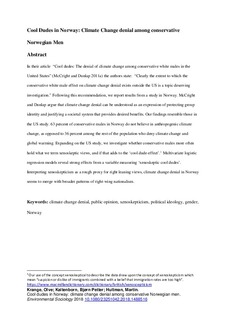| dc.contributor.author | Krange, Olve | |
| dc.contributor.author | Kaltenborn, Bjørn Petter | |
| dc.contributor.author | Hultman, Martin | |
| dc.coverage.spatial | Norway | nb_NO |
| dc.date.accessioned | 2018-08-27T10:08:04Z | |
| dc.date.available | 2018-08-27T10:08:04Z | |
| dc.date.created | 2018-08-23T15:02:43Z | |
| dc.date.issued | 2018 | |
| dc.identifier.issn | 2325-1042 | |
| dc.identifier.uri | http://hdl.handle.net/11250/2559408 | |
| dc.description.abstract | In their article “Cool dudes: The denial of climate change among conservative white males in the United States” (McCright and Dunlap 2011a) the authors state: “Clearly the extent to which the conservative white male effect on climate change denial exists outside the US is a topic deserving investigation.” Following this recommendation, we report results from a study in Norway. McCright and Dunlap argue that climate change denial can be understood as an expression of protecting group identity and justifying a societal system that provides desired benefits. Our findings resemble those in the US study. 63 percent of conservative males in Norway do not believe in anthropogenic climate change, as opposed to 36 percent among the rest of the population who deny climate change and global warming. Expanding on the US study, we investigate whether conservative males more often hold what we term xenoskeptic views, and if that adds to the ‘cool dude-effect’.1 Multivariate logistic regression models reveal strong effects from a variable measuring ‘xenoskeptic cool dudes’. Interpreting xenoskepticism as a rough proxy for right leaning views, climate change denial in Norway seems to merge with broader patterns of right-wing nationalism. | nb_NO |
| dc.language.iso | eng | nb_NO |
| dc.subject | climate change denial | nb_NO |
| dc.subject | public opinion | nb_NO |
| dc.subject | xenoskepticism | nb_NO |
| dc.subject | political ideology | nb_NO |
| dc.subject | gender | nb_NO |
| dc.title | Cool dudes in Norway: climate change denial among conservative Norwegian men | nb_NO |
| dc.title.alternative | Cool dudes in Norway: climate change denial among conservative Norwegian men | nb_NO |
| dc.type | Journal article | nb_NO |
| dc.type | Peer reviewed | nb_NO |
| dc.description.version | acceptedVersion | nb_NO |
| dc.rights.holder | © 2018 Informa UK Limited, trading as Taylor & Francis Group | nb_NO |
| dc.subject.nsi | VDP::Samfunnsvitenskap: 200::Sosiologi: 220 | nb_NO |
| dc.source.journal | Environmental Sociology | nb_NO |
| dc.identifier.doi | 10.1080/23251042.2018.1488516 | |
| dc.identifier.cristin | 1604095 | |
| dc.relation.project | Norges forskningsråd: 60022 | nb_NO |
| cristin.unitcode | 7511,6,0,0 | |
| cristin.unitcode | 7511,5,0,0 | |
| cristin.unitname | Oslo | |
| cristin.unitname | Lillehammer | |
| cristin.ispublished | true | |
| cristin.fulltext | postprint | |
| cristin.qualitycode | 1 | |
